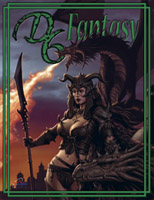 Do you remember West End Games? WEG was the company that brought us many successful roleplaying games including Paranoia and Star Wars. Star Wars used a very cinematic and easy to learn rules system: the D6 System. After WEG lost the Star Wars license, they released three D6 System core rule books: D6 Space, D6 Fantasy and D6 Adventure. Each book was written with one genre in mind, but the rules were compatible and gamemasters were able (if not encouraged) to mix and match rules from the three books. So, why should we bother about D6 anymore, when there are much bigger systems like D&D, GURPS, etc. still going strong?
Do you remember West End Games? WEG was the company that brought us many successful roleplaying games including Paranoia and Star Wars. Star Wars used a very cinematic and easy to learn rules system: the D6 System. After WEG lost the Star Wars license, they released three D6 System core rule books: D6 Space, D6 Fantasy and D6 Adventure. Each book was written with one genre in mind, but the rules were compatible and gamemasters were able (if not encouraged) to mix and match rules from the three books. So, why should we bother about D6 anymore, when there are much bigger systems like D&D, GURPS, etc. still going strong?

In December Eric Gibson, WEG’s current owner, announced that the D6 System is going to become OpenD6. OpenD6 will probably be released under a license similar to OGL but Eric (aka Hellsreach) also mentioned Creative Commons. And as you may guess that would be my favorite license.
He also plans to setup a special OpenD6 site, where anyone can download the SRD he needs. You just decide which rules you want to have included in your personal rulebook and the website creates a personalized version just for you.Gamers will also be able to upload their rules and modifications to the OpenD6 site, too, so that they are available to everyone else as well. And if this really  works out, the community should support something like this.
works out, the community should support something like this.
D6 has been created for the Ghostbusters RPG back in the day, but it has been successfully used in the Star Wars Roleplaying Game and quite a few other games. If you own at least one of the core rules you can easily play in any genre you want. Since D6 doesn’t use any levels or classes it can be easily modified without breaking the game. Although I like games like D&D a lot, I always considered classes problematic because they are often not easily modified for genres they were not designed for.
But the best argument for the D6 System is that it’s easy to learn and fast to play. At first D6 only uses six-sided dice, so you don’t need any fancy dice which makes it especially handy to introduce newcomers to roleplaying. Every attribute and skill is ranked by a die code like 3D+2 for example. To make a check on a skill ranked 3D+2 you have to roll three dice, sum up the result and add 2. This final result is then compared to a difficulty. If your result was equal or higher than the difficulty, you succeeded. You don’t need any more knowledge as a player to play any D6 game.
I’ve been playing a lot of Star Wars back in the day, when WEG still held the license. And now I am thinking about blowing off the dust from the D6 core books I bought a couple of years ago and use them for my next campaign.
By the way, if you want to discuss D6 further, you should check out the WEG Fan Forums (WEG’s owner is a regular poster there).
If you don’t own the D6 rules, yet, you can get them for $13 each at RPGNow. Or you order a printed copy directly from WEG.

I currently own a copy of D6 Fantasy and was thinking of using it as a stepping stone to introduce RPGs to my girlfriend. Still going through the rules though but I'm still in a dilemma between 4E or D6 and dices.
<abbr><abbr>Questing GMs last blog post..Word of Wizards – Design & Development: Ask R&D</abbr></abbr>
@Questing: Valiant was developed for D6 Fantasy. I literally picked up the book for the first time the day we made characters and for the second time the day of the first game. It really is that easy.
It has both the best advantage and the worst flaw of rules-lite systems, though. It's easily modified but you probably have to modify it to fill in the details it leaves out.
<abbr><abbr>Viriathas last blog post..Short Takes 02/21/09</abbr></abbr>
D6 is an awesome system because it is so simple to learn. I wish they would just get the dang OGL system out there so games can start using it. There is still a great fan-base out there for it and I believe it could be very successful. However, they need to bring it into the new age and market it to the gamers of today. It needs shiny new packaging and a good company to back it.
<abbr><abbr>Samuel Van Der Walls last blog post..Old School Gaming – Marvel Super Heroes RPG</abbr></abbr>
Dude. I LOVE the d6 system. It was the ruleset of my very first RPG experience (Star Wars d6) and has informed pretty much every homebrew/DIY initiative I've been a part of since then. Such a superb, simple system. Nothing is quite so satisfying as rolling 15 dice when attacking the Death Star with your X-Wing.
<abbr><abbr>PatrickWRs last blog post..Safety behind walls…for a price</abbr></abbr>
Most of the "fan base" that's out there are the grognards who cut their teeth on D6 Star Wars. Guess what guys? Star Wars isn't coming back to D6.
<abbr><abbr>F. Douglas Walls last blog post..Go Google yourself!</abbr></abbr>
Guess what? I don't mind. D6 is a great system that can stand on its own even without a big license like Star Wars behind it. And not everyone enjoying D6 is a grognard I can tell you.
What is funny is that the "psi" rules in d6 space is better at replicating Force powers than the old d6 Starwars ever did.
Reminds me of GURPS.